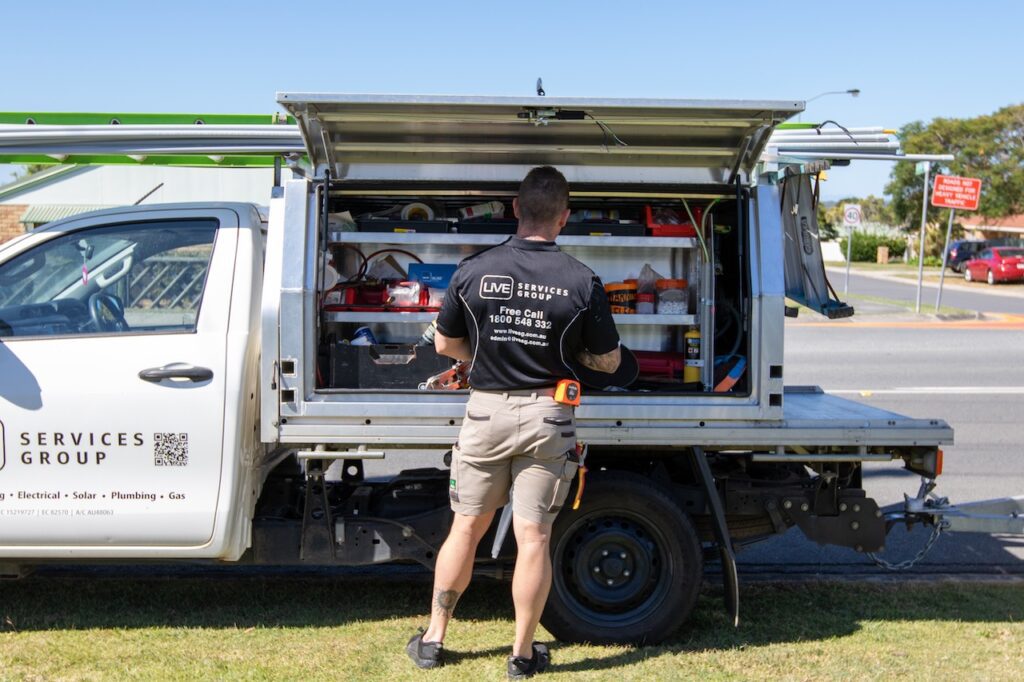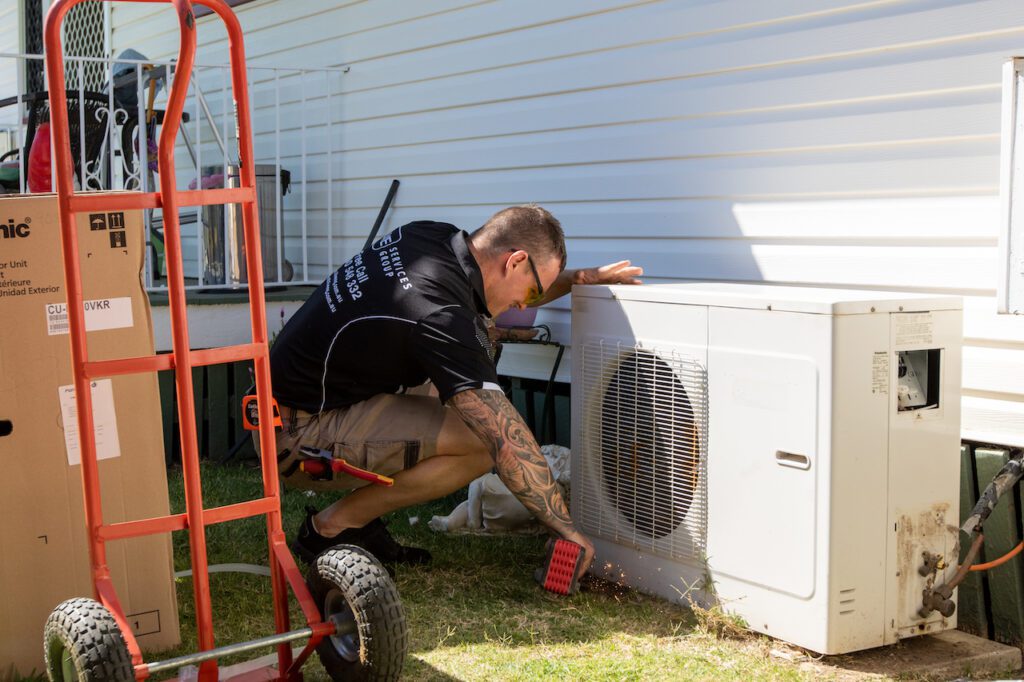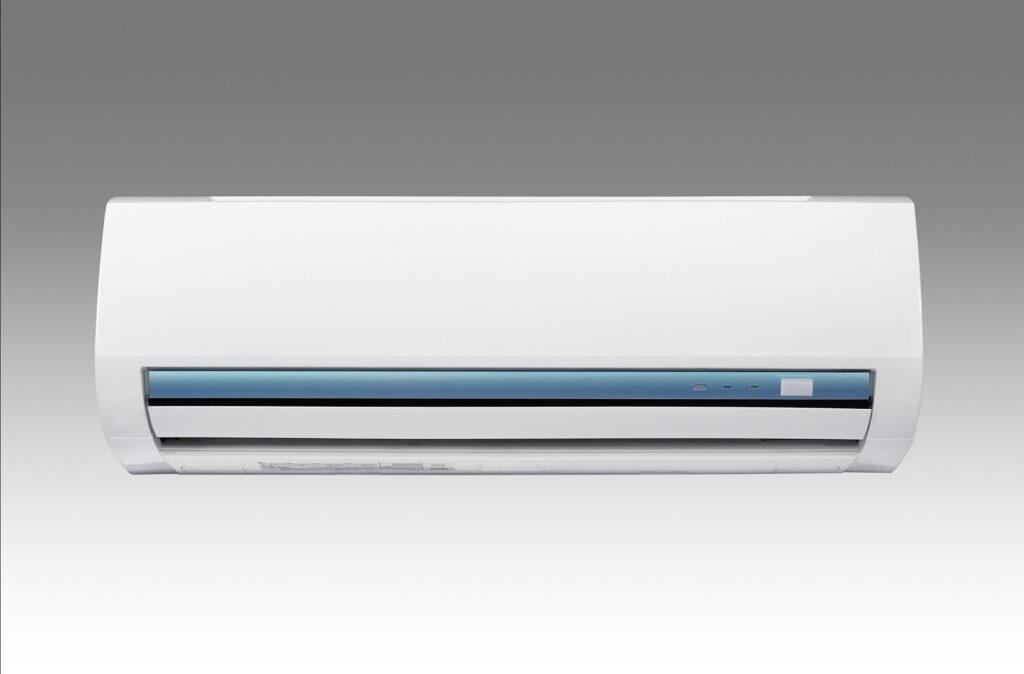Air conditioning is a key component of modern life, providing relief from hot and humid weather in the summer months. Many homeowners rely on air conditioners to maintain a comfortable indoor climate throughout the year, but just how long will these systems last? This article examines the lifespan of an air conditioner, looking at factors that influence its longevity and offering tips for extending its useful life.
Air conditioners are designed with different components, each of which can affect their durability and expected lifespan. The average aircon has a built-in compressor motor as well as electrical controls and switches, fans, condenser coils and more. These parts must be working correctly in order to ensure optimal performance and efficiency over time. Regular maintenance and repair can help extend the life of an aircon system by ensuring all components are functioning properly.
In addition to regular maintenance, there are other steps that can be taken to maximize the lifetime of an air conditioner system. Energy-efficient models require less energy input while running, resulting in lower electricity bills over time. Additionally, selecting units with features such as programmable thermostats or zone control allows users to customize their cooling needs and reduce wear on individual components. Properly sizing an AC unit for one’s home also helps avoid unnecessary strain on certain components.
Understanding Average Lifespan
Understanding the average lifespan of an air conditioner is vital for any homeowner. Knowing how long it typically lasts can help you plan and budget accordingly, as well as alert you to signs it’s time to replace your unit. Generally speaking, most air conditioner’s last around 15 to 20 years before needing to be replaced. However, with proper maintenance and care, some units may last much longer.
It’s important to know what factors contribute to determining when it’s time for a new AC unit. Temperature extremes in different climates can affect the life expectancy of your air conditioner, as well as its size and efficiency level. It’s also beneficial to be aware of certain warning signs that could indicate it’s time to get a new one. These include loud noises coming from the unit or rooms not cooling properly – both are indications that something may need repairing or replacing altogether.
Understanding what affects the longevity of your AC unit will help ensure that you make the best decision when considering if it’s time for a replacement.
What Affects How Long Your Ac Unit Lasts?
The average lifespan of an air conditioner is approximately 10 years, but factors such as climate and maintenance may affect this number. In humid climates like Queensland’s, a typical AC unit can last 8-10 years while in drier climates it could last up to 12 or more. While the location you live in may determine how long your air conditioning system will run efficiently, there are other things to consider when determining its longevity.
First, what objects surround the AC unit? Trees, shrubs and debris can block airflow which reduces efficiency and increases energy bills. They also provide shade that allows the condenser coils to overheat, leading to premature failure of components. The Samsung AC system has built-in sensors that help protect against these issues by detecting if too much dirt builds up on the filter or if a foreign object blocks the fan blades from spinning freely.
Second, what type of weather conditions do you experience? Humid Queensland summers with sweltering heat put extra strain on AC units due to increased levels of moisture in the air. This leads to higher electric bills since an outdated unit must work harder than usual just to keep indoor temperatures comfortable – especially during peak hours when demand for electricity rises exponentially. On the other hand, dry conditions like those found in Arizona require less energy consumption overall so even older systems can still remain functional for longer periods of time.
Finally, look out for warning signs that indicate it’s time to replace your air conditioner before it fails completely. These include strange noises coming from inside the unit (like rattling), leaking water around the baseplate area outside or poor cooling performance even after regular maintenance has been performed regularly throughout its life cycle. If any of these issues arise then it’s important to contact an HVAC professional who can diagnose and repair them before they become major problems down the line.
| Factors | Impact on Life Span |
|---|---|
| Usage Frequency | Increases life span |
| Environment Conditions | Decreases/Increases life span |
| Maintenance & Care | Increases life span |
| Proper Checkups & Cleaning | Increases efficiency & reduces repair costs |
It is essential to understand how different climatic conditions and surrounding elements affect your ac system’s longevity so that you can plan ahead and get maximum value out of your investment without unexpected breakdowns or costly repairs along the way. By being aware of both positive and negative factors associated with owning an air conditioner, homeowners can make informed decisions about their heating & cooling needs as well as better manage their energy bill costs in order remain comfortable all year round!

Signs That Indicate You Need To Replace or Repair Your Air Conditioner
Are you feeling a little bit too warm in your home, despite having your air conditioner running? To the untrained eye it may seem like time to replace your air conditioning unit. However, there are many signs that indicate it’s time for a new unit and knowing when is essential if you want to save money and make sure your family is comfortable year-round.
- Uneven cooling: If some rooms are cooler than others, this could mean the system needs to be replaced or serviced.
- Warm air production: If the temperature of the air coming out of the vents isn’t cold anymore then it’s likely time for a replacement.
- System fatigue: When an AC runs constantly without proper maintenance its components can start to fail more often leading to needing a new unit sooner rather than later.
Though these are all indicators that something might be wrong with your current system, they don’t always mean it’s time for a complete replacement—sometimes just calling an HVAC technician will do the trick. But if you find yourself dealing with any of these issues on a regular basis, chances are good that you should consider replacing your air conditioner before further damage occurs. Knowing how long do air conditioners last and being aware of other signs that it’s time for a change will help ensure efficient and reliable performance from your unit so you can stay cool during hot summer days.
Tips On Making Your Air Conditioner Last Longer
Regular maintenance is one of the best ways to extend the life of an air conditioner. The more frequent and thorough inspections and cleanings can help minimize wear and tear on parts, catch problems early, and even prevent breakdowns before they occur. Additionally, it’s important that the unit should stay dry whether by using a cover or allowing airflow so condensation does not build up near components. If it’s been eight years since you last replaced your system, then it might be time for a new unit as most have an average lifespan between ten to fifteen years. Even the best air conditioning systems may need routine repairs from time to time due to normal wear and tear over its lifetime which will affect the life expectancy of your unit.
When considering whether to repair or replace an AC unit, there are several signs that indicate it’s time for a new one such as higher energy bills than usual, loud noises during operation, inconsistent cooling throughout rooms in house, leakage around baseboards or windowsills, bad odors coming from vents when running or rusting inside or outside of unit. Knowing these tips can help extend the life of your existing system if replacement isn’t yet necessary. With proper maintenance and care, an air conditioner should provide many years of comfort without requiring major repairs or replacements.
Breaking down each air conditioning systems average life expectancy provides homeowners with useful information to make informed decisions about their home cooling needs.

Breaking Down Each Air Conditioning Systems Average Life Expectancy
It’s hard to imagine that even the most reliable air conditioner won’t last forever. But, unfortunately, all air conditioning units have an expiration date – and understanding how long a particular system should last is key in knowing when it’s time to replace. Just like any other appliance or piece of machinery, there are many variables that affect how long an AC unit will last: its size, the quality of parts used during installation, regular maintenance and more. To help you determine just how long your AC can be expected to work properly before needing replacement, let’s take a closer look at the average lifespan of each type of cooling system.
For starters, window air conditioners tend to have one of the shortest lifespans in comparison with other types of AC systems – typically lasting between 8 and 12 years on average; this is due to their smaller size as well as limited exterior protection from the elements. A standard central air conditioning unit has a slightly longer lifetime expectancy than that of a window unit – usually around 10-15 years – depending on usage levels and if preventive maintenance was performed regularly throughout its lifespan. Additionally, reverse cycle ducted systems generally hold up better over time because they’re larger in size but also protected by insulation from both inside and out; often boasting an average life expectancy ranging anywhere from 15-20 years or more!
However, no matter what type or size system you use for your home or business cooling needs ,one thing remains true: Regular inspections and maintenance are essential for keeping your AC running smoothly and efficiently–and extending its overall lifespan beyond its normal range. By taking good care of your AC system now, you’ll be able to ensure that it lasts as long as possible so you don’t have to worry about replacing it any sooner than necessary down the road.
What’s The Lifespan Of A Ducted AC System?
Ducted air conditioners can provide a great way to cool and heat your home or office. With the right system, it is possible to maximize its efficiency while minimizing energy costs. The life span of an air conditioner depends on its quality, how often it is used, and what kind of maintenance plan you have in place for it. A new air conditioning system might last up to 15 years if properly maintained, but older systems may only last around 10 years before needing some type of repair work done.
When trying to determine the lifespan of an air conditioner, there are several factors that need to be taken into consideration such as the age of the unit, amount of use, and level of maintenance performed on it. Poorly insulated ducts will cause warm air from outside to enter the house which puts extra stress on your air conditioner resulting in a shorter lifespan than expected. Additionally, poor indoor air quality can also affect the longevity of an air conditioner by causing dust buildup inside the unit over time. Checking regularly for signs that your air conditioning unit has become clogged with dirt or debris will help ensure optimal performance for a longer period of time – ensuring maximum cooling or heating power when you most need it!
Regular maintenance is key to extending the life expectancy of any appliance including ducted air conditioners. Regular cleaning and filter changes should be completed at least every six months depending on usage levels and other variables such as pets or allergies that could negatively impact indoor air quality. Taking simple steps like these can make all the difference in increasing your unit’s effectiveness and keeping it running optimally year after year.
When thinking about replacing an old system, consider investing in a newer model designed specifically for energy efficiency and improved airflow offering better control over temperature regulation throughout your home – providing comfort without compromising cost or quality.
How Long Do Reverse Cycle Air Conditioners Last?
Like a long-distance runner, an air conditioner can last many years if taken care of properly. How long it will last depends on the make and model, how often its used, and maintenance done. The typical lifespan of a new air conditioner is 10 to 15 years for central AC systems and up to 20 years for HVAC split system home air conditioning units. However, when your compressor is on its last leg or you have an old AC unit that’s nearing the end of its life expectancy, it may be time to replace it before costly repairs become necessary.
To get the most out of your reverse cycle air conditioners use them wisely. Keeping them running constantly throughout summer isn’t advised as this decreases their efficiency and shortens their life span. Keep temperatures at 78 degrees during peak hours and raise them by 7–10 degrees when no one is home in order to save energy while still keeping cool indoors. Get regular maintenance checks such as oiling motors and cleaning filters so that they don’t overwork due to dirt build-up resulting in early failure or further damage. By taking good care of your system, you can ensure optimal performance from year to year without having to worry about replacing it sooner than expected.
How Long Do Split System Air Conditioners Last?
Split system air conditioners can last for many years, but not indefinitely. Generally speaking, a split system air conditioner that is installed properly should last at least ten years. After the original installation however, over time its performance may start to decrease due to normal wear and tear. This will be evidenced by an increase in warm air being released from your unit or a decrease in the amount of steady airflow from it. At this point, you may need to replace the entire AC system with a new one if you want to continue having regular levels of cool air in your home again.
The cost of replacing a split system air conditioner depends on various factors such as size and brand; however, there are some ways to extend the life of your existing unit without spending any money. For example, ensuring that all filters are regularly cleaned and replaced when necessary will help reduce system fatigue over time. Additionally taking advantage of free services such as yearly tune-ups can help keep your unit running efficiently while also extending its longevity. With these steps taken into consideration, it’s possible to get more out of a single AC before needing to invest in a new one altogether.

Extend The Life Of Your AC With Our Expert Help
Homeowners may be wondering how long their air conditioners are expected to last. On average, the life of a split system air conditioner is about 10-15 years with proper maintenance and care. However, some can last up to 20 or even 25 years depending on certain factors like usage frequency, environment conditions etc.
To extend the life of your AC and avoid costly repairs, it’s important to properly maintain it and conduct regular checkups. Regular cleaning and checking ensure that all parts work as they should which helps keep energy costs down while ensuring maximum efficiency in cooling performance. It also prevents premature aging due to dirt buildup or clogged filters leading to reduced airflow — something you don’t want when hot and sticky weather arrives!
It might be time for a new unit instead of pouring money into an old one which would just end up costing more over time. Knowing how long your AC will last allows you to make better decisions on whether you need a new one or not. At LiVE Services Group we provide top-quality air con services so that you get the best value for money from your purchase of the right air conditioning system for your home needs. Our experts have many years of experience helping homeowners find solutions tailored specifically to them so contact us today if you think it’s time for an upgrade!
Frequently Asked Questions
What Is The Cost To Replace An Air Conditioner?
Replacing an air conditioner can be a costly undertaking. The cost depends on the type of system, the size and efficiency rating, as well as local labor costs. In addition to the purchase price, installation fees may also need to be taken into consideration. To ensure that you are making the right decision for your home’s needs, it is important to weigh all factors before investing in a new unit.
When determining whether or not replacing an air conditioner is necessary, consider how old the current unit is and when it was last serviced. An older model may require more frequent repairs than newer ones, which could lead to higher overall expenses over time. It is recommended to have annual maintenance performed by a qualified technician; this will help keep systems running efficiently and reduce chances of unexpected failure caused by lack of regular upkeep. Additionally, if the existing unit does not meet modern standards for energy-efficiency, replacing it with one that does could result in long-term savings due to lower electricity bills and reduced carbon footprint.
In order to make sure you are getting the most out of your investment when purchasing a replacement air conditioner, research different brands and models available on the market today. Consider features such as noise level ratings, warranty coverage options, seasonal performance levels and expected lifetime span so you can compare different choices side-by-side. With careful planning and evaluation of each option, homeowners should be able to find an efficient and reliable system at an affordable cost without sacrificing quality or comfort in their homes.
How Often Should Air Conditioners Be Serviced?
The frequency of servicing an air conditioner is often overlooked in a home maintenance schedule. Regular servicing can help to ensure that the unit operates efficiently and safely, with minimal disruption due to breakdowns or malfunctions. For example, consider the case of Joe Smith who installed an AC unit in his home five years ago but neglected regular servicing until it broke down last summer. He was surprised by how much more expensive it was to repair than if he had been proactive about servicing from the beginning.
Regularly scheduling service for your air conditioner is important for catching small problems before they become larger issues. This includes checking the refrigerant levels, lubricating moving parts, cleaning filters, inspecting wiring and hoses for damage or wear, as well as testing capacitors and other components. It’s also beneficial to check vents and dampers for blockage. All these steps will help keep your AC running at its optimal performance level while minimizing energy costs and reducing breakdowns over time.
For most units, having them serviced once a year is sufficient; however this can vary depending on usage and location. Homeowners should be aware of their environment such as humidity levels and whether they are near any potential sources of dust or debris which may affect system efficiency or require additional attention during routine maintenance checks. Additionally, those living in areas prone to extreme temperatures may benefit from twice yearly inspections of their systems to make sure everything is working effectively when needed most – when outdoor temperatures peak either in summer or winter months.
Servicing an air conditioner regularly not only helps maintain equipment performance but saves money on costly repairs resulting from neglecting regular upkeep. Scheduling annual/bi-annual inspections reduces unexpected downtime caused by emergency repairs; allowing you peace of mind knowing that your climate control needs are taken care of throughout the year.
Are Air Conditioners Energy Efficient?
Air conditioners have become an indispensable part of many residential and commercial buildings. The question then arises: are air conditioners energy efficient? To answer this, one must first look at the impact that air conditioning has on the environment as well as its financial implications for users.
In terms of environmental impact, air conditioners can be both beneficial and detrimental. On the plus side, modern units use significantly less electricity than their predecessors, leading to lower emissions of greenhouse gases like carbon dioxide into the atmosphere. Additionally, they help keep indoor temperatures comfortable during hot weather, which reduces reliance on heating systems and thus also helps minimize emissions. Conversely, however, older models may consume more electricity due to inefficient designs or lack of maintenance; this in turn can lead to higher production of pollutants such as ozone-depleting CFCs (chlorofluorocarbons).
When it comes to cost savings associated with using an air conditioner unit efficiently, there are several methods available depending on individual circumstances. For instance:
- Installation & Maintenance: This includes choosing a unit appropriate for size requirements; making sure all components are properly insulated; regularly cleaning/replacing filters; and having annual tune ups done by a qualified technician.
- Operation & Use: This involves setting temperature levels appropriately (not too high or low); avoiding overcooling rooms unnecessarily; running fans in tandem with AC units when necessary; scheduling regular time intervals for usage throughout the day; and closing off unused areas from circulation.
- Energy Efficiency Measures: These include taking advantage of natural ventilation whenever possible; installing programmable timers or thermostats to reduce overall consumption levels; enrolling in utility company incentive programs; and replacing worn out parts before they cause damage to other components.
Overall, while there is some debate regarding just how “green” air conditioning truly is given its potential impacts on global warming, it remains a viable option for keeping homes cool if used responsibly. With proper installation techniques, regular servicing schedules, judicious operation habits and effective energy efficiency measures taken into account – users should find that their AC units provide valuable service without breaking the bank in terms of excessive power bills or environmental harm.
Are There Any Specific Models Of Air Conditioners That Last Longer?
When considering the lifespan of an air conditioner, it is important to recognize that specific models can last longer than others. Different types of AC units such as window or wall-mounted systems vary widely in terms of the expected life expectancy and how long they will remain energy efficient. Additionally, a variety of factors including routine maintenance, usage patterns and environmental conditions all play a role in determining how long an AC unit may last.
The average life expectancy for most air conditioning units ranges from 10 to 15 years with proper maintenance being key to its longevity. It should be noted that newer models tend to have higher energy efficiency ratings which can result in lower operating costs over time; however, these new technologies also come at a greater initial cost. For those looking for more durable options certain brands are known for their durability such as Daikin’s MXS series commercial system which has been proven to last up to 20 years when properly maintained.
Finally, purchasing an extended warranty on your AC unit may also help you identify potential problems before they become too costly and increase the overall lifespan of your system. Additionally, taking proactive steps like having regular checkups performed by certified HVAC technicians can go a long way towards ensuring your unit continues to run smoothly and reliably for many years down the line.





